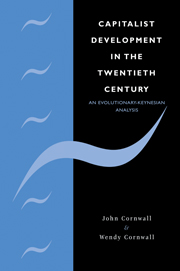Book contents
- Frontmatter
- Contents
- List of figures
- List of tables
- Foreword by David Colander
- Preface
- Part I Framework
- 1 Economic development and economic performance
- 2 The stylized facts
- 3 The neoclassical analysis of unemployment
- 4 An extended Keynesian model
- 5 Institutions and power
- 6 Evolutionary and hysteretic processes
- 7 Theories of capitalist development
- Part II Explaining the development record
- Part III Political control of the economy
- Bibliography
- Index
7 - Theories of capitalist development
Published online by Cambridge University Press: 22 September 2009
- Frontmatter
- Contents
- List of figures
- List of tables
- Foreword by David Colander
- Preface
- Part I Framework
- 1 Economic development and economic performance
- 2 The stylized facts
- 3 The neoclassical analysis of unemployment
- 4 An extended Keynesian model
- 5 Institutions and power
- 6 Evolutionary and hysteretic processes
- 7 Theories of capitalist development
- Part II Explaining the development record
- Part III Political control of the economy
- Bibliography
- Index
Summary
Introduction: the political economy tradition
The objective of this chapter is to provide the context for our proposed analytical method and its explanation of economic development in the twentieth century. To this end, we examine several well-known schools of thought that treat structural change as an integral feature of capitalist development. Abstracting from the detail, we focus on the broad characteristics that distinguish them from each other. Of greatest interest are the causes and mechanisms of change, and the extent to which each can explain periods of good and poor economic performance as a continuous process. These characteristics are then compared with those of our approach.
The central place of structural change, which typifies the development of capitalism, has a long and respectable pedigree within economics. For many early economists, structural change was capitalism's overwhelming characteristic, making capitalist development incomprehensible except in its historical context. This emphasis on structural change persists in several fields within economics, some of which are discussed later in this chapter. However, in the recent past economists have shifted their attention to those aspects of macroeconomic dynamics that are amenable to mathematical modelling. These models, which include both neoclassical and Keynesian formulations, describe the interactions of purely economic variables, and ignore structural change even while professing to model long-run outcomes. This has created a dichotomy between the currently conventional macrodynamics and those treatments of the subject that continue in the political economy tradition.
- Type
- Chapter
- Information
- Capitalist Development in the Twentieth CenturyAn Evolutionary-Keynesian Analysis, pp. 112 - 126Publisher: Cambridge University PressPrint publication year: 2001
- 1
- Cited by

